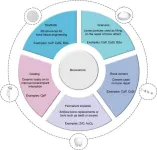(Press-News.org) TORONTO, Ontario, Canada, 31 December 2024 - In a comprehensive Genomic Press Interview, leading geneticist Dr. Cathy Barr unveils crucial discoveries about the complex interplay between genes and childhood psychiatric disorders. As a Senior Scientist at both the Hospital for Sick Children and Krembil Research Institute, Dr. Barr's research illuminates the genetic foundations of conditions including depression, attention-deficit/hyperactivity disorder, reading disabilities, and Tourette syndrome.
"After decades of searching for genes contributing to psychiatric disorders, we are now blessed with a plethora of risk genes," Dr. Barr explains. "The challenge is to understand how genetic variation alters gene and cell function. We are using multiple molecular techniques and stem cell-derived neural cells to understand how genetic variation alters cell function."
Dr. Barr's journey into genetic research began with a pivotal moment in her high school biology class, where a medical resident's presentation about a genetic condition sparked her curiosity. This early exposure to genetics' role in human disease shaped her future career path, leading to groundbreaking research that now helps explain why children with neurodevelopmental disorders face a fivefold increased risk of depression.
Through innovative approaches combining CRISPR technology with stem cell models, Dr. Barr and her team are uncovering how DNA variations influence neural cell behavior. Their work raises intriguing questions about potential therapeutic interventions: How might understanding genetic variations lead to more targeted treatments? What role do shared risk factors play across different disorders?
"I hope that the knowledge gained from the study of genetics reduces the stigma for psychiatric disorders and leads to more specific treatments," says Dr. Barr, highlighting her commitment to translating scientific discoveries into practical medical applications.
The significance of Dr. Barr's research extends beyond individual conditions, offering insights into the broader landscape of neurodevelopmental disorders. Her work suggests new approaches to early intervention and treatment, particularly important given the interconnected nature of these conditions. This research opens new avenues for understanding how genetic predispositions interact with environmental factors to influence brain development and function.
Dr. Cathy Barr’s Genomic Press interview is part of a larger series that highlights the people behind today’s most influential scientific ideas. Each interview in the series offers a blend of cutting-edge research and personal reflections, providing readers with a comprehensive view of the scientists shaping the future. By combining a focus on professional achievements with personal insights, this interview style invites a richer narrative that both engages and educates readers. This format provides an ideal starting point for profiles that delve into the scientist’s impact on the field, while also touching on broader human themes. More information on the research leaders and research rising stars featured by Genomic Press can be found in our publication website: https://genomicpress.kglmeridian.com/.
The full Genomic Press Interview, titled “Cathy Barr: Genetics and neurobiology of childhood psychiatric and cognitive disorders” is available in Genomic Psychiatry, offering readers an unparalleled opportunity to explore the thoughts and experiences of one of the most influential minds in neuroscience and neurobiology of brain disorders. The article is freely available online at https://doi.org/10.61373/gp024k.0097.
About Genomic Psychiatry – Genomic Psychiatry: Advancing Science from Genes to Society (ISSN: 2997-2388) represents a paradigm shift in genetics journals by interweaving advances in genomics and genetics with progress in all other areas of contemporary psychiatry. Genomic Psychiatry publishes peer-reviewed medical research articles of the highest quality from any area within the continuum that goes from genes and molecules to neuroscience, clinical psychiatry, and public health.
END
Geneticist unlocks mysteries of childhood psychiatric disorders through innovative research
Professor Cathy Barr discusses genetic foundations of neurodevelopmental conditions in exclusive Genomic Press Interview
2024-12-31
ELSE PRESS RELEASES FROM THIS DATE:
New study uncovers key insights into protein interactions in Duchenne muscular dystrophy, paving way for more targeted therapies
2024-12-31
AURORA, Colo. (Dec. 31, 2024) – A groundbreaking study has shed light on the complex interactions between dystrophin, a protein critical to muscle stability, and its partner protein, dystrobrevin, offering new pathways for understanding and treating Duchenne Muscular Dystrophy (DMD).
Published in the December issue of the Journal of Biological Chemistry, researchers characterize the mysterious C-terminal (CT) domain of dystrophin and its role in stabilizing cellular membranes across various tissues.
DMD, a severe genetic disorder that causes muscle weakness and shortens lifespans, arises from mutations in the gene encoding ...
Revolutionizing fragrance design using deep neural networks (DNNs) scent profiles from chemical data
2024-12-31
Scientific research explores the potential of DNNs in transforming fragrance design. By analyzing the sensing data of 180 essential oils, the DNN was trained using the odor descriptor data from 94 essential oils to generate fragrance profiles, validated through sensory evaluations to align with human olfactory perceptions. The study underscores the technological ability to streamline fragrance creation, reduce costs, and foster innovation, opening up exciting possibilities for personalized and scalable scent development.
Deep Neural Networks (DNNs) have become an essential driver of innovation across various industries, ...
Custom-fit bone grafts: the future of craniomaxillofacial surgery
2024-12-31
A recent review is transforming the landscape of craniomaxillofacial bone regeneration with the introduction of personalized bioceramic grafts. This pioneering research explores the fabrication and clinical potential of synthetic grafts created through additive manufacturing (AM), addressing key limitations of traditional autogenous grafts. By focusing on 3D-printed bioceramics tailored to meet individual patient needs, the study marks a significant advancement in both precision medicine and patient-specific care, offering new hope for those requiring bone reconstruction.
Craniofacial bone defects, resulting from trauma, congenital conditions, or surgical ...
A new ‘molecular lantern’ detects brain metastasis in mice by inserting a probe thinner than a hair into the brain
2024-12-31
Monitoring the changes caused in the brain at the molecular level by cancer and other neurological pathologies in a non-invasive way is one of the great challenges of biomedical research. A new technique, still in the experimental stage, achieves this by introducing light into the brains of mice using a very thin probe. The innovation, which is published today in the journal Nature Methods, is ledby an international team including groups from the Spanish National Research Council (CSIC) and the Spanish National Cancer Research ...
McGill scientist reveals how early life experiences reshape our genes and brain health
2024-12-31
MONTREAL, Quebec, Canada, 31 December 2024 - In a comprehensive Genomic Press Interview, renowned neuroscientist Dr. Michael Meaney reveals pivotal discoveries about the intricate relationship between genes and environment in shaping brain health. As a James McGill Professor Emeritus and former Director of the Translational Neuroscience program at ASTAR Singapore, Dr. Meaney's research has fundamentally altered our understanding of how early-life experiences influence genetic expression and brain development.
"I have always been genuinely fascinated ...
Renowned scientist reveals vital link between inflammation and depression through groundbreaking research
2024-12-31
JERUSALEM, Israel, 31 December 2024 - In a comprehensive Genomic Press Interview, distinguished neuroscientist Professor Raz Yirmiya unveils transformative insights into the relationship between inflammation and depression. As head of the Laboratory for Psychoneuroimmunology at the Hebrew University of Jerusalem, Professor Yirmiya's work has fundamentally changed our understanding of depression's biological underpinnings.
"Most depressed patients do not have any overt inflammatory disease. However, we and others found that exposure to stress, which is the most significant trigger of depression in humans and animals, also ...
Medical researcher explores economic impact of psychedelic therapy implementation
2024-12-31
ATLANTA, Georgia, USA, 31 December 2024 - In a comprehensive Genomic Press Interview, Emory University MD candidate Fayzan Rab shares insights into his pioneering research on the economic and public health implications of psychedelic therapy implementation. Rab's work at the Emory Center for Psychedelics and Spirituality bridges the gap between clinical research and real-world healthcare delivery systems.
"It would be a fool's errand to say that psychedelic therapies alone would change that," says Rab, discussing mental healthcare challenges. "Treating mental illness will require changes within clinical practice but also investments into social safety ...
Improving immunotherapies for kidney cancer
2024-12-30
A Medical University of South Carolina Hollings Cancer Center researcher is exploring new ways to improve treatment options for kidney cancer patients. With funding from a Department of Defense (DOD) Academy of Kidney Cancer Investigators Early Career Scholar Award, Aguirre de Cubas, Ph.D., will investigate how the immune system can be boosted to detect and kill kidney tumors. Congress established the award in 2017 to support research with high potential impact and exceptional scientific merit. De Cubas’ approach focuses on reactivating the immune system to recognize and target cancer cells better, offering new possibilities for improving existing ...
Billing patients for portal messages could decrease message volume and ease physician workload
2024-12-30
Embargoed for release until 5:00 p.m. ET on Monday 30 December 2024
@Annalsofim
Below please find summaries of new articles that will be published in the next issue of Annals of Internal Medicine. The summaries are not intended to substitute for the full articles as a source of information. This information is under strict embargo and by taking it into possession, media representatives are committing to the terms of the embargo not only on their own behalf, ...
Study of Sherpas highlights key role of kidneys in acclimatization to high altitudes
2024-12-30
(Calgary) — A study from a Mount Royal University physiologist and his team demonstrates the key role of the kidneys in acclimatization to high altitude, and illustrates another way that Sherpas are better adapted to high altitude ascent.
Results from the study were recently published in in the prestigious international science journal Proceedings of the National Academy of Sciences.
The paper, “Comparing integrative ventilatory and renal acid-base acclimatization in lowlanders and Tibetan highlanders during ascent to 4,300 m”, describes findings ...
LAST 30 PRESS RELEASES:
Scientists discover “bacterial constipation,” a new disease caused by gut-drying bacteria
DGIST identifies “magic blueprint” for converting carbon dioxide into resources through atom-level catalyst design
COVID-19 vaccination during pregnancy may help prevent preeclampsia
Menopausal hormone therapy not linked to increased risk of death
Chronic shortage of family doctors in England, reveals BMJ analysis
Booster jabs reduce the risks of COVID-19 deaths, study finds
Screening increases survival rate for stage IV breast cancer by 60%
ACC announces inaugural fellow for the Thad and Gerry Waites Rural Cardiovascular Research Fellowship
University of Oklahoma researchers develop durable hybrid materials for faster radiation detection
Medicaid disenrollment spikes at age 19, study finds
Turning agricultural waste into advanced materials: Review highlights how torrefaction could power a sustainable carbon future
New study warns emerging pollutants in livestock and aquaculture waste may threaten ecosystems and public health
Integrated rice–aquatic farming systems may hold the key to smarter nitrogen use and lower agricultural emissions
Hope for global banana farming in genetic discovery
Mirror image pheromones help beetles swipe right
Prenatal lead exposure related to worse cognitive function in adults
Research alert: Understanding substance use across the full spectrum of sexual identity
Pekingese, Shih Tzu and Staffordshire Bull Terrier among twelve dog breeds at risk of serious breathing condition
Selected dog breeds with most breathing trouble identified in new study
Interplay of class and gender may influence social judgments differently between cultures
Pollen counts can be predicted by machine learning models using meteorological data with more than 80% accuracy even a week ahead, for both grass and birch tree pollen, which could be key in effective
Rewriting our understanding of early hominin dispersal to Eurasia
Rising simultaneous wildfire risk compromises international firefighting efforts
Honey bee "dance floors" can be accurately located with a new method, mapping where in the hive forager bees perform waggle dances to signal the location of pollen and nectar for their nestmates
Exercise and nutritional drinks can reduce the need for care in dementia
Michelson Medical Research Foundation awards $750,000 to rising immunology leaders
SfN announces Early Career Policy Ambassadors Class of 2026
Spiritual practices strongly associated with reduced risk for hazardous alcohol and drug use
Novel vaccine protects against C. diff disease and recurrence
An “electrical” circadian clock balances growth between shoots and roots
[Press-News.org] Geneticist unlocks mysteries of childhood psychiatric disorders through innovative researchProfessor Cathy Barr discusses genetic foundations of neurodevelopmental conditions in exclusive Genomic Press Interview






